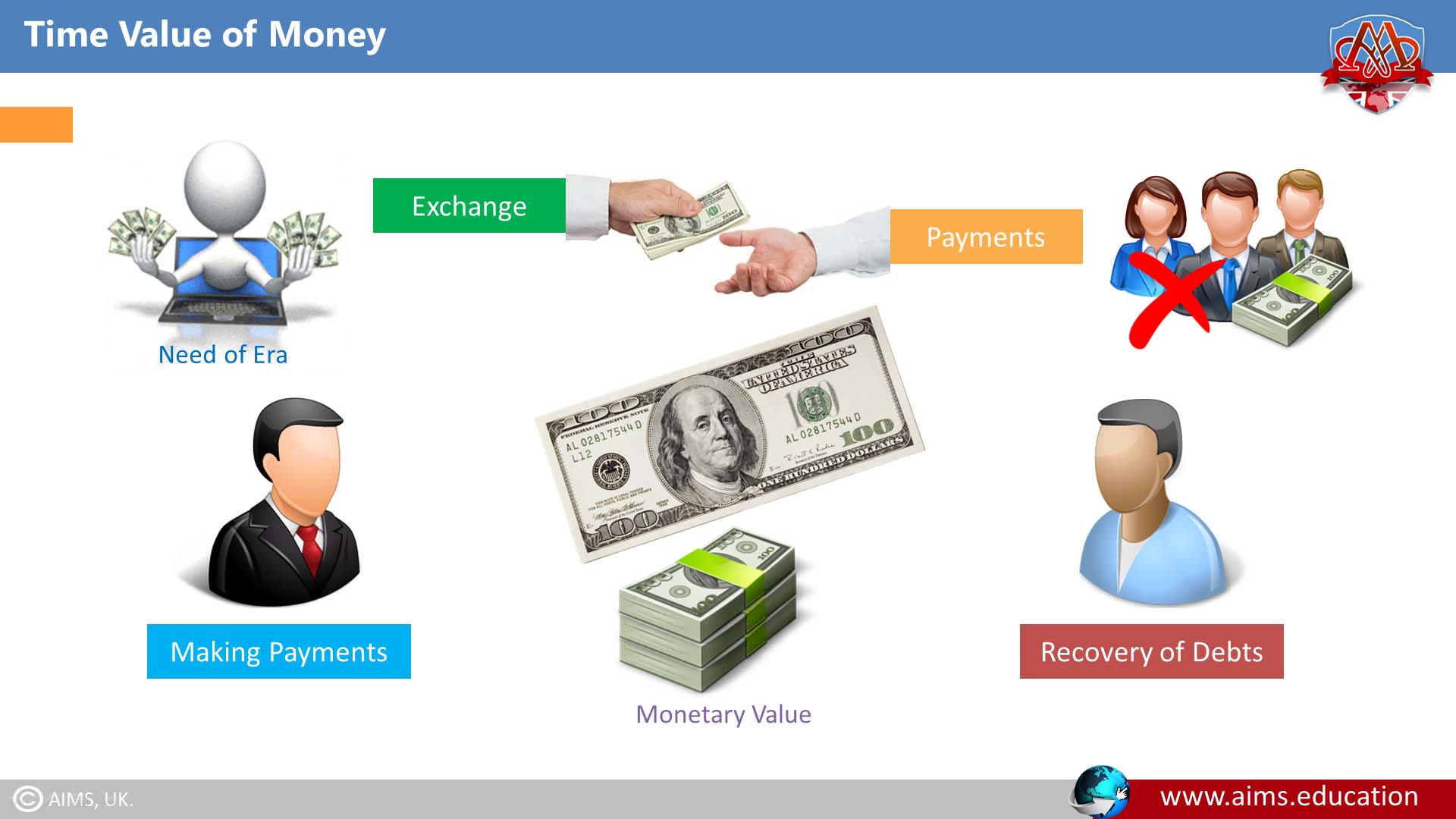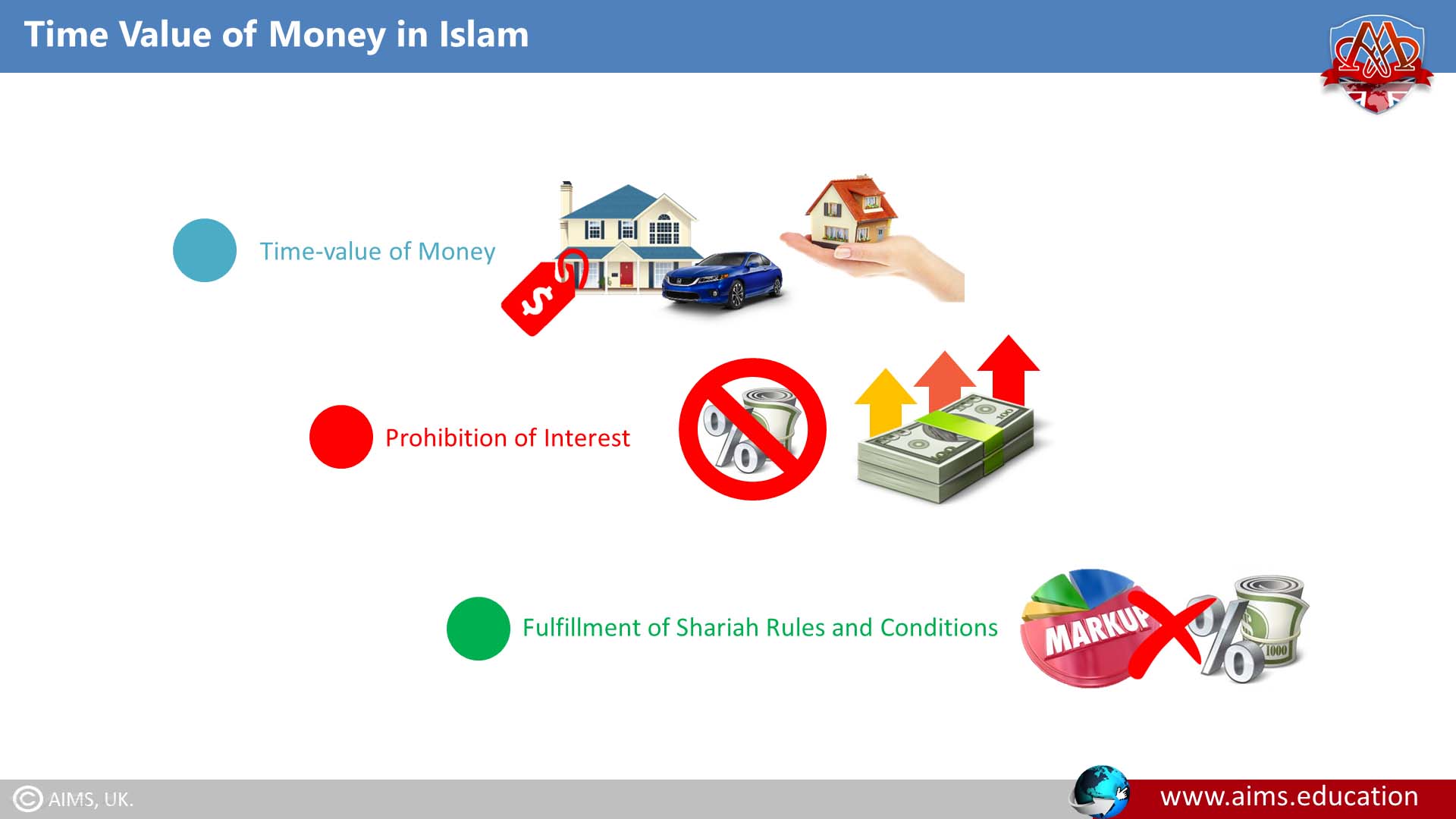Concept of Time Value of Money in Islam:
As a fundamental principle in finance, the concept of time value of money is equally important in Islamic finance. It could be argued that understanding the concept of time value of money is even more crucial in Islamic finance due to its unique principles and ethical considerations. The time value of money usually leads to riba, so Islam does not recognize the value of money in any type of rescheduling of debts. According to Muslim law, once a sale is mutually agreed between the parties, any addition of money to this price due to delay is prohibited and haram. This is because, the commodity once sold even on credit, belongs to the purchaser, and the seller has no right to re-price it. Any addition in its price is considered as Riba or interest. However, the time value of money’s Islamic perspective should not be mixed with Islamic financial instruments.

Time Value of Money – Riba-Based Conventional Concept:
The time value of money acknowledges that a dollar today is worth more than a dollar tomorrow. It’s all about earning interest or investment returns over time, which can strategically maximize resources and make more informed choices when it comes to saving, investing, and spending.
Concept of Money in Islamic Banking and Finance
In Islamic finance, time value of money is not seen solely from a profit-driven perspective. Rather, it takes into account the spiritual and ethical values of Islam. This includes the prohibition of interest (riba) and excessive risk-taking, as well as promoting social responsibility and justice in financial dealings.
In addition to the concept of time value of money, it is also important to discuss the broader concept of money in Islamic banking. In Islamic finance, money is not seen as a commodity but rather as a medium of exchange and measure of value. It is also seen as a tool for social welfare and economic stability, rather than just individual profit.
EXAMPLE
To illustrate the concept of time value of money in Islam, consider a scenario involving an interest-free loan, or Qard Hasan. Suppose an individual lends $5000 to a friend for one year, with no interest charge. In conventional finance, this would be seen as a loss for the lender due to the time value of money – the lender could have invested that money and earned interest. However, in Islamic finance, the concept of interest (or riba) is prohibited and the loan is seen as an act of benevolence. Thus, despite the potential ‘loss’ in terms of conventional finance, the lender is honored for their charitable act under the ethical values of Islam.
Exceptional Cases of Murabahah and Salam Contracts
1. PRICE OF COMMODITY:
- The increase in the price of the commodity in the original transaction is because of deferred payment, which is a valid sale. As could be seen in the Murabahah contract.
2. FUTURE DELIVERY OF GOODS:
- Salam as a forward contract enables payment in advance for future delivery of the goods, which is genuinely less than the cash-n-carry price.
In simple terms, the time value of money refers to the idea that money has a greater worth in the present than it does in the future. This is because money can be invested or used to earn returns over time. Therefore, receiving $100 today is more valuable than receiving $100 one year from now. In Islamic finance, the concept of the time value of money is viewed through the lens of risk and uncertainty (gharar). The concept takes into consideration the changing value of money due to inflation, as well as the possibility of default or non-performance in financial transactions.
IT IS IMPORTANT TO NOTE THAT,
- The time value of money in Islamic finance is acceptable concerning the pricing of assets and their usufruct.
- In Islam, interest or riba is prohibited due to being increased over any loan or debt.
- Murabahah is subject to fulfillment of Sharia rules and conditions, however, the mark-up technique should not be used, as a back door for allowing interest.

Time Value of Money: Islamic VS. Conventional Prospective:
The time value of money in Islam is based on the core principles of Shariah, which emphasize the importance of fairness, transparency, and ethical conduct in all monetary transactions. As a result, the time value of money in Islam presents a unique perspective that is geared towards fostering social justice and equitable distribution of resources.
The time value of money in Islamic finance lies in the idea that the value of money changes over time, and this principle plays a crucial role in shaping the Islamic financial landscape. For instance:
- Unlike conventional financial systems that heavily rely on interest-based transactions, Islamic finance strictly forbids the practice of charging or paying interest, as it is considered unjust and exploitative.
- Instead, Islamic finance promotes profit-sharing arrangements and risk-sharing contracts, which ensure that all parties involved in a transaction are treated fairly and share the gains and losses equally.
- Islamic teachings encourage the efficient use of time and discourage procrastination, as time is considered a finite and valuable resource that must be utilized effectively. This philosophy is reflected in various Islamic financial instruments, such as deferred payment sales, where the deferred payments must be determined and agreed upon to avoid speculation and uncertainty.

Settlement of Debts and Currency Rate Fluctuation:
According to Islamic Shariah, when a financial contribution takes the form of a loan or a debt, it is to be paid back exactly in the same kind and quantity, irrespective of any change in the value of the currency, or price of commodity lent or borrowed. This principle applies to Loans, debts, credit, barter, deferred exchange of currency, indemnity, change in the unit of currency, and delayed payment of remuneration after devaluation or revaluation. However, if the currency of the debt becomes extinct, or not available, its counter value will be paid, and the rate of the due date will be applicable.
The Following was concluded in the 5th Session of OIC Fiqh Academy:
“Significantly, a fixed debt is repaid in its currency, and not by its counter value, because debts are settled in the same currency. Thus, it is not permitted to attach fixed debts, whatever their source to currency fluctuation”.
Rules from OIC Fiqh Academy:
Time value of money Islamic perspective, on the 8th session of the Fiqh Academy approved the following:
- The creditor and debtor may agree on the day of settlement, but not before, to the settlement of the debt in a currency other than the one specified for the debt, provided the rate of exchange applied is applicable on the settlement date.
- Similarly, for debts due in installments in a specific currency, the parties may agree on the day of settlement of any installment, to have it effected in full in a different currency, at the prevailing rate of exchange, on the date of settlement.
- A conditional requirement in all cases is that no part of the amount subject to the currency exchange should remain outstanding, as required under Shariah rules of exchange of currencies.
- The two parties to the contract may, at the time of contracting, agree to the settlement of the deferred cost or salary in a specific currency to be settled in a single payment, or in installments in a variety of currencies or against a given amount of gold the settlement may also be made.
- A debt contracted in a specific currency, should not be recorded against the debtor in its counter value in gold or other currencies. This is because such practice would make it compulsory for the debtor, to settle the debt in gold or the other currency, as agreed upon for the settlement.

Summary:
The time value of money in Islamic finance offers a refreshing and ethical alternative to conventional financial systems. By upholding the values of fairness, transparency, and social justice, it seeks to create a more equitable and sustainable economic environment for everyone. With its profound emphasis on the moral and ethical dimensions of finance, the time value of money in Islam serves as a shining example of how faith and economics can come together to promote the greater good.
